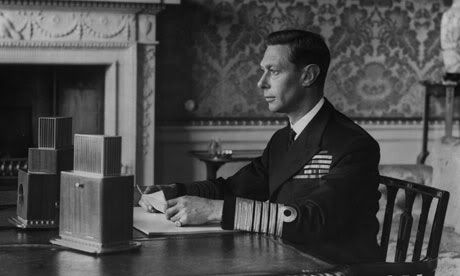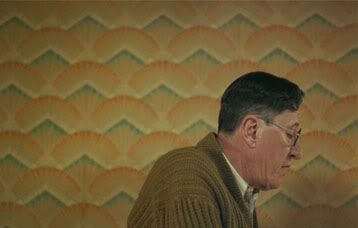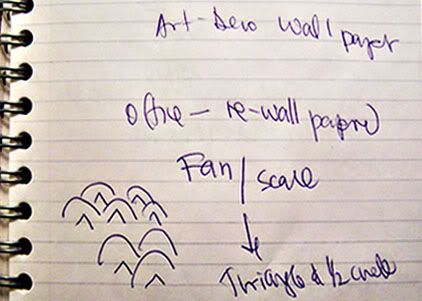 |
September 3, 1939, after Britain's declaration of war
against Germany.
[Photograph: Hulton-Deutsch Collection/Corbis]
"If I am to be King...where is my
power? May I form a Government,
levy a tax or declare a war? No!
Yet I am the seat of all authority.
Why? Because the Nation believes
when I speak, I speak for them. Yet
I cannot speak!"
"Through his broadcasts, George VI
became a symbol of national resistance."
"Onward!"
I took notes (in the dark) while watching The King's Speech. I had already seen the movie once, and came prepared with pen and paper (actually, a notebook) to write down quotes, impressions, dialogs, scenes, set design, etc. I especially tried to link image with dialog, and with sound - there is a subtle, delicate, link between sound (mostly music) and image. At the end credits, my recognition of the sound's quality was rewarded when I learned that Alexandre Desplat composed original music for the film. I had already encountered Desplat's music for Roman Polanski's 2010 film The Ghost Writer, and how well it connected with the images.
I thought it would be interesting to reproduce these notes on my blog, to provide some insight on the film's construction, at least working backwards from the finished product.
Below are the notes, more-or-less in chronological order.
--------------------------------------------------------------------------------------
- King's speech in front of crowd at the Empire Exhibition in Wembley
- Stuttering - drops of notes, jarring violins (like horror film - anticipation?)
- Echo of stutter
-------------------------------
- A doctor gives King George marbles as an Ancient Greek cure for stuttering
-------------------------------
- Foggy in London
- Music more melodious - Queen Elizabeth going to Harley Street therapist
-------------------------------
- Queen Elizabeth visiting speech therapist (Dr. Logue) anonymously
- Describes the King position as "indentured servitude"
-------------------------------
- Logue on a stage, rehearsing "Now is the winter of our discontent" as Richard III, a deformed creature yearning to be King
-------------------------------
- London, exterior scenes - music is melodious
-------------------------------
- Young Princesses Elizabeth and Margaret in play room - King doesn't stutter while playing with them
- Corgi dogs
-------------------------------
- Johnson: King George's name during WWI to detract the enemy
-------------------------------
-Wall in Logue's office - stripped wallpaper
-------------------------------
- King George reads "To be or not to be"
- Beethoven in speakers/headphones - Logue gets him to read with headphones on
- "Simple mechanics" tongue twister - "I am a thistle-sifter..."
- Clumsy Freudian psychology - "mother"/"father"
-------------------------------
- Deathbed of father - music solemn, violins, minor key
-------------------------------
- Logue's office
- "Try singing it" - to avoid stuttering
- "Continuous sound will give you flow"
-------------------------------
- Music - Childhood memories - violins, piano notes
- Abusive nanny
-------------------------------
- Talking of brother - epileptic, retarded
- Music melancholic
-------------------------------
- Balmoral Castle, in Scotland
- To visit Edward and Mrs. Simpson
- Piano - melodic
- Brothers in Scotland
- 1930s dance music background
-------------------------------
- Choosing name as King - Albert to George
- With Churchill
-------------------------------
- Edward's radio broadcast - solemn music
- "Discharge my duty...succeeded by my brother"
-------------------------------
- Logue's home - Art-Deco wallpaper, fan/scale/, triangle and half circle
(below, I have drawn diagram of design):
 |  |
- Meeting of doctor's wife and Queen
-------------------------------
- View of West Minister Abbey from above, then King is in the frame
- Solemn music
-------------------------------
- Real footage of coronation
- Hitler's speech
- Resignation of PM - "wrong about Hitler"
-------------------------------
- The King's speech
- "Because the Nation believes when I speak, I speak for them. Yet I cannot speak!"
- "Onward!"
-------------------------------
- Beethoven - Speech length of music
- "Conducted" by Logue
- Musical
-------------------------------
- At final credits:
"Through his broadcasts, George VI became a symbol of national
resistance."